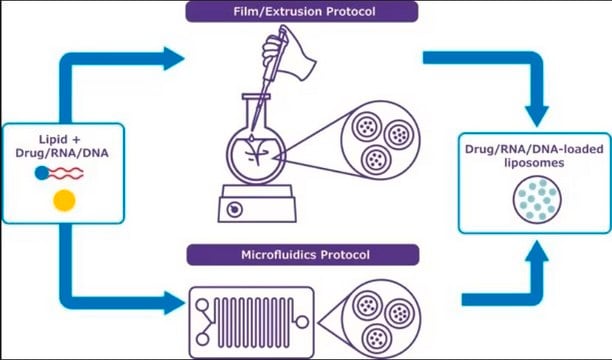933589
NanoFabTx™ NanoFlash PEG Lipid Mix
for CIJ synthesis of PEGylated liposomes
Sign Into View Organizational & Contract Pricing
All Photos(1)
About This Item
UNSPSC Code:
12352211
NACRES:
NA.21
Recommended Products
Quality Level
storage temp.
−20°C
Application
NanoFabTx™ NanoFlash PEG Lipid Mix a ready-to-use nanoformulation lipid blend that includes lyophilized lipids and step-by-step instructions for synthesizing PEGylated liposomes for small molecule drug delivery applications. Lipid-based formulations are widely used for drug delivery and enable improved therapeutic efficacy of a range of drug types PEGylated liposomes are capable of encapsulating both hydrophilic and lipophilic compounds and are an effective mechanism to increase the efficiency of drug delivery by prolonging the lifetime of the drug-encapsulated liposome.
This lipid mix has been curated and designed for flash nanoprecipitiaton (FNP) synthesis using a confined impingement jet (CIJ) mixer, such as the NanoFabTx™ NanoFlash CIJ Mixer, and detailed step-by-step instructions are provided.
This lipid mix has been curated and designed for flash nanoprecipitiaton (FNP) synthesis using a confined impingement jet (CIJ) mixer, such as the NanoFabTx™ NanoFlash CIJ Mixer, and detailed step-by-step instructions are provided.
Features and Benefits
- A ready-to-use nanoformulation lipid blend for the synthesis of PEGylated liposomes
- Step-by-step protocols (extrusion and microfluidics) developed and tested by our formulation scientists
- Flexible synthesis tool to create uniform and reproducible liposomes
- Optimized to make liposomes around 100 nm with low polydispersity
- Optimized lipid blend for stealth PEGylated liposomes for small molecule encapsulation
- A lipid film hydration and extrusion protocol
- A microfluidics protocol using commercial platforms or syringe pumps
Legal Information
NANOFABTX is a trademark of Sigma-Aldrich Co. LLC
Storage Class Code
11 - Combustible Solids
WGK
WGK 3
Choose from one of the most recent versions:
Certificates of Analysis (COA)
Lot/Batch Number
Don't see the Right Version?
If you require a particular version, you can look up a specific certificate by the Lot or Batch number.
Already Own This Product?
Find documentation for the products that you have recently purchased in the Document Library.
Which polymers can make nanoparticulate drug carriers long-circulating?
VP, Torchilin, et al.
Advanced Drug Delivery Reviews, 16, 141?155-141?155 (1995)
Jing Han et al.
Journal of pharmaceutical sciences, 101(10), 4018-4023 (2012-07-11)
Johnson and Prud'homme (2003. AICHE J 49:2264-2282) introduced the confined impingement jets (CIJ) mixer to prepare nanoparticles loaded with hydrophobic compounds (e.g., drugs, inks, fragrances, or pheromones) via flash nanoprecipitation (FNP). We have modified the original CIJ design to allow
L D Mayer et al.
Biochimica et biophysica acta, 1025(2), 143-151 (1990-06-27)
Studies from this laboratory (Mayer et al. (1986) Biochim. Biophys. Acta 857, 123-126) have shown that doxorubicin can be accumulated into liposomal systems in response to transmembrane pH gradients (inside acidic). Here, detailed characterizations of the drug uptake and retention
Daryl C Drummond et al.
Cancer research, 66(6), 3271-3277 (2006-03-17)
Liposome formulations of camptothecins have been actively pursued because of the potential for significant pharmacologic advantages from successful drug delivery of this important class of anticancer drugs. We describe nanoliposomal CPT-11, a novel nanoparticle/liposome construct containing CPT-11 (irinotecan) with unprecedented
T D Madden et al.
Chemistry and physics of lipids, 53(1), 37-46 (1990-03-01)
We have shown previously that transmembrane proton gradients can be used to efficiently accumulate biogenic amines [M.B. Bally et al. (1988) Chem. Phys. Lipids 47, 97-107] and doxorubicin [L.D. Mayer, M.B. Bally and P.R. Cullis (1986) Biochim. Biophys. Acta 857
Our team of scientists has experience in all areas of research including Life Science, Material Science, Chemical Synthesis, Chromatography, Analytical and many others.
Contact Technical Service






